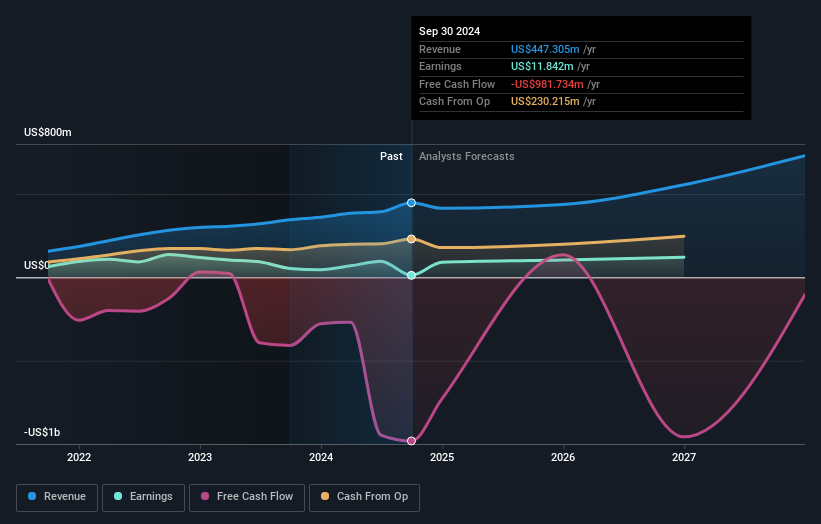- United States
- /
- Marine and Shipping
- /
- NasdaqGS:CCEC
The five-year decline in earnings for Capital Clean Energy Carriers NASDAQ:CCEC) isn't encouraging, but shareholders are still up 78% over that period

The main point of investing for the long term is to make money. But more than that, you probably want to see it rise more than the market average. Unfortunately for shareholders, while the Capital Clean Energy Carriers Corp. (NASDAQ:CCEC) share price is up 38% in the last five years, that's less than the market return. Meanwhile, the last twelve months saw the share price rise 1.4%.
Although Capital Clean Energy Carriers has shed US$53m from its market cap this week, let's take a look at its longer term fundamental trends and see if they've driven returns.
View our latest analysis for Capital Clean Energy Carriers
In his essay The Superinvestors of Graham-and-Doddsville Warren Buffett described how share prices do not always rationally reflect the value of a business. One imperfect but simple way to consider how the market perception of a company has shifted is to compare the change in the earnings per share (EPS) with the share price movement.
During five years of share price growth, Capital Clean Energy Carriers actually saw its EPS drop 29% per year.
This means it's unlikely the market is judging the company based on earnings growth. Because earnings per share don't seem to match up with the share price, we'll take a look at other metrics instead.
In contrast revenue growth of 25% per year is probably viewed as evidence that Capital Clean Energy Carriers is growing, a real positive. In that case, the company may be sacrificing current earnings per share to drive growth.
The image below shows how earnings and revenue have tracked over time (if you click on the image you can see greater detail).

Take a more thorough look at Capital Clean Energy Carriers' financial health with this free report on its balance sheet.
What About Dividends?
When looking at investment returns, it is important to consider the difference between total shareholder return (TSR) and share price return. The TSR incorporates the value of any spin-offs or discounted capital raisings, along with any dividends, based on the assumption that the dividends are reinvested. So for companies that pay a generous dividend, the TSR is often a lot higher than the share price return. In the case of Capital Clean Energy Carriers, it has a TSR of 78% for the last 5 years. That exceeds its share price return that we previously mentioned. And there's no prize for guessing that the dividend payments largely explain the divergence!
A Different Perspective
Capital Clean Energy Carriers shareholders gained a total return of 4.9% during the year. Unfortunately this falls short of the market return. If we look back over five years, the returns are even better, coming in at 12% per year for five years. It may well be that this is a business worth popping on the watching, given the continuing positive reception, over time, from the market. It's always interesting to track share price performance over the longer term. But to understand Capital Clean Energy Carriers better, we need to consider many other factors. Take risks, for example - Capital Clean Energy Carriers has 4 warning signs (and 3 which are concerning) we think you should know about.
We will like Capital Clean Energy Carriers better if we see some big insider buys. While we wait, check out this free list of undervalued stocks (mostly small caps) with considerable, recent, insider buying.
Please note, the market returns quoted in this article reflect the market weighted average returns of stocks that currently trade on American exchanges.
New: AI Stock Screener & Alerts
Our new AI Stock Screener scans the market every day to uncover opportunities.
• Dividend Powerhouses (3%+ Yield)
• Undervalued Small Caps with Insider Buying
• High growth Tech and AI Companies
Or build your own from over 50 metrics.
Have feedback on this article? Concerned about the content? Get in touch with us directly. Alternatively, email editorial-team (at) simplywallst.com.
This article by Simply Wall St is general in nature. We provide commentary based on historical data and analyst forecasts only using an unbiased methodology and our articles are not intended to be financial advice. It does not constitute a recommendation to buy or sell any stock, and does not take account of your objectives, or your financial situation. We aim to bring you long-term focused analysis driven by fundamental data. Note that our analysis may not factor in the latest price-sensitive company announcements or qualitative material. Simply Wall St has no position in any stocks mentioned.
About NasdaqGS:CCEC
Capital Clean Energy Carriers
A shipping company, provides marine transportation services in Greece.
Reasonable growth potential slight.

